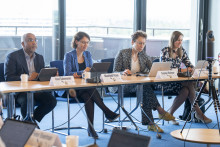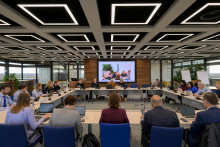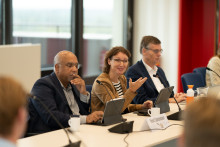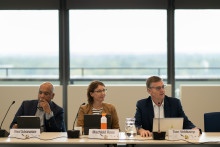The Faculty of Science & Technology (S&T) has already announced a reorganisation, ATLAS will cease to exist and other units are trying to get their financial situation in order, in which the deficit in the budget for 2025 may not exceed one percent of the first money stream. The University Council said that a lot of time is lost with this approach. Time that – hence the 'No time to waste' crisis team – is not there. 'The Executive Board keeps repeating'we are in this together' and therefore we expect a more proactive and directing role that goes beyond the level of the individual unit, and does not wait until all units have finished making their plans and budgets,' says Emile Dopheide (Campus Coalition).
Tasks program manager organizational changes
Then there is the appointment of the programme manager for organisational changes: Karin Bax. The University Council sees the value of her appointment, but believes that the scope, tasks and responsibilities of the role should be better defined. 'On the one hand, it is indicated that the programme manager must take care of the implementation of the building blocks. On the other hand, it is said that together with the programme team, she should supervise the cost-cutting and organisational change processes. The two seem to be different from each other and each requires a different approach', said Eline Marsman, also a member of the Campus Coalition.
'High transaction costs'
The University Council was also critical of the immediate measures: the end of Student Jobs, a stop to external hiring, a hiring freeze and no more international travel on the first flow of money. 'Apparently easy to implement and they are expected to yield financial profits, but in practice the transaction costs are high and the effects on primary processes are serious and already tangible', according to the central participation body.
The University Council also saw – referring to, for example, the programme manager – that a stop to external hiring is apparently not feasible. 'Hiring external staff can undermine the credibility of such a measure.' According to the council, the community is also curious to see how long the acute measures will remain in force. Machteld Roos, vice-president of the Executive Board, could not give a concrete answer to this, but indicated that 'you shouldn't think about just a few months'.
Interfaculty units
Dopheide also touched on building block interfaculty units, 'which are often explicitly mentioned as units that can be stopped, redesigned, merged or downsized.' The council was interested in what exactly the approach is for each of these units, such as DesignLab, Robotics Centre, Twente Graduate School, Pre-U and Fraunhofer. 'The units differ significantly. Therefore, the approach and decision-making process for possible changes must differ.' In his answer, Rector Tom Veldkamp hinted at a redesign of these 'expensive units, with a lot of overlap'.
What the council was most concerned about: the impact on students and the identity of the UT. According to Emer Waarts (DAS), students have to deal with a lot of uncertainty about the future. 'The cutbacks have a major impact on them. Reducing the number of assistants, for example, not only affects the quality of education, but also the financial stability of many students.'
According to her, the disappearance of student jobs, combined with less support for student activism, threatens to undermine the core of the university's identity, where student engagement – both through work and activism – plays a key role in promoting campus culture. 'If these opportunities disappear, students will not only be deprived of financial stability, but also of the opportunity to actively contribute to shaping the university community, which is often the reason for students to choose UT.'
In their reply, the Executive Board reiterated the importance of clear communication about the steps to be taken. President of the Executive Board Vinod Subramaniam: 'I assure you that we are showing leadership and we will come out of this as a university.'







